Welcome to the week. Here are the most notable stories we came across in the past seven days.
The present and future of WFH: The rise in teleworking since Covid might be the biggest disrupter of transportation behaviors in our lifetime. This interview with an expert on the topic is essential reading to understand its impacts on emissions, VMT, and more. (Bloomberg)
The real test of good policy: NYC’s decongestion pricing is working well so far, but it, “now faces a crucial test that every good climate policy going forward will have to pass: Can its success stand up to a relentless campaign of fake populist counternarrative and reactionary misinformation?” (The New Republic)
Safety stops work: The wild success of the “bicycle safety stop” — aka Idaho Stop — is a shining example of how we need to stop treating bikes like cars and open up our minds to the fact that these very different types of vehicles often need different types of laws. (Streetsblog CA)
Trump tariffs and e-bikes: A north Portland bike shop owner was interviewed in this story about how some folks are eager to purchase e-bikes before any potential tariffs from the Trump Administration result in higher prices. (OPB)
Bike shop closures: An industry expert says statistics back up the idea that there’s been a big increase in local bike shop closures, and he even cites Portland’s estimated 30% decrease in shops since 2024 as evidence. (Bicycle Retailer & Industry News)
Vulnerable road user laws: Really important story with direct connection to Oregon examines the good intentions of laws made to stiffen penalties for careless drivers and how they are typically not enforced and drivers are rarely prosecuted for hitting someone. (Washington Post)
Portland’s problem: Another outlet has tried to make sense of the fact that, despite Portland’s reputation as an urban planning and transportation leader, we have not been able to reduce traffic deaths. (Streetsblog USA)
Welcome to the war on cars: Noted researcher, academic, and broadcaster David Suzuki says a report published by his eponymous foundation found that emissions reductions from EVs have been wiped out due to emissions increases from SUVs and light-duty trucks. Suzuki also says, more broadly that, “car culture has fueled the climate crisis from the beginning”. (David Suzuki Foundation)
If not in golf courses, then…: If politicians think using golf course land for housing isn’t palatable, how about using massive parking lots? (Seattle Times)
Thanks to everyone who sent in links this week. The Monday Roundup is a community effort, so please feel free to send us any great stories you come across.



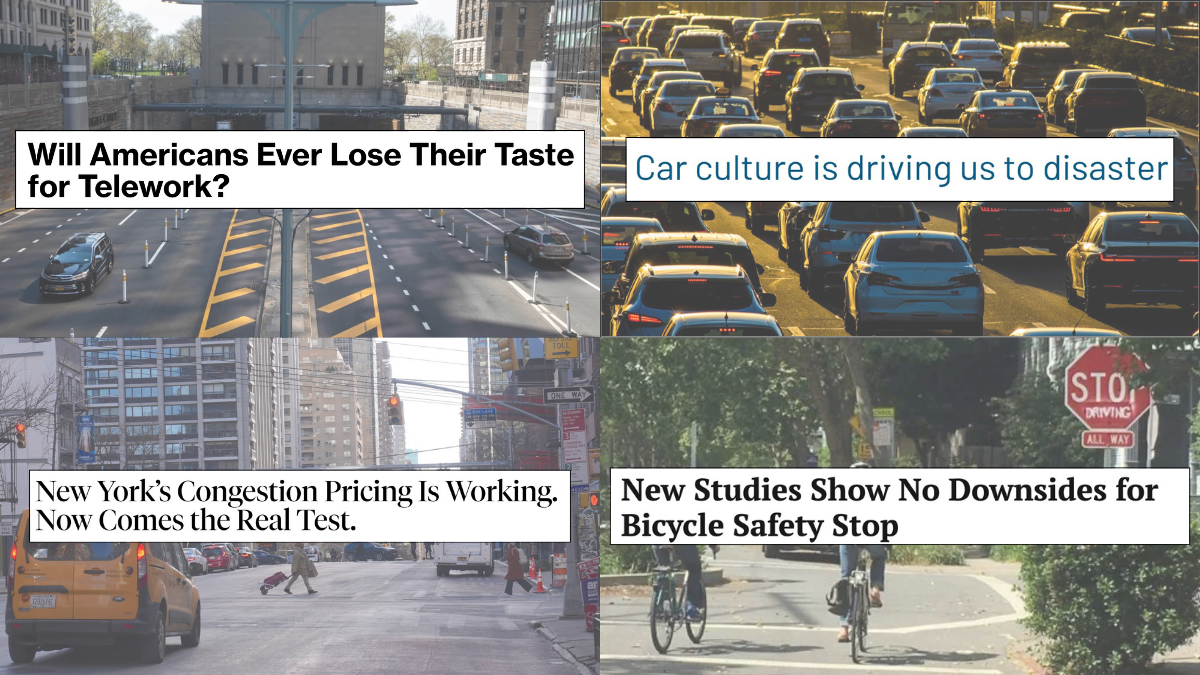
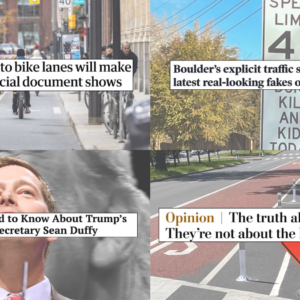
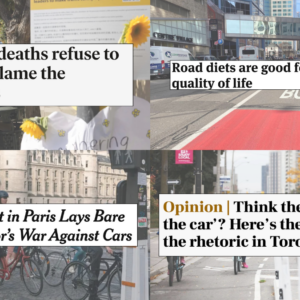
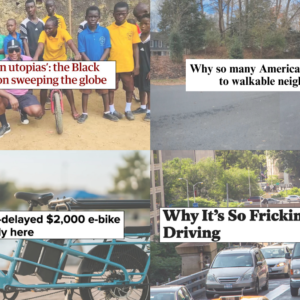
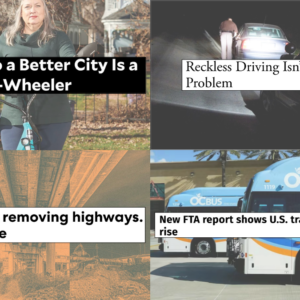
Thanks for reading.
BikePortland has served this community with independent community journalism since 2005. We rely on subscriptions from readers like you to survive. Your financial support is vital in keeping this valuable resource alive and well.
Please subscribe today to strengthen and expand our work.
Echoes of last week’s discussion of Class 3 electric bicycles.
This article is pretty useless, but it does suggest the important point that as we increasingly rely on online shopping and automated cars arrive, the arguments for copious parking will fade and we’ll be left with lots of largish blocks of unused, somewhat but not overly degraded land, not to close to existing residential neighbors — perfect for dense housing.
This is essentially the argument for redeveloping Lloyd Center. We could fit a ton of housing there without disrupting existing communities. Start the bulldozers already.
The new TIF districts from Prosper are structured in a way to allow for the master-planned developments at Lloyd, the old post office, and OMSI so I’d say that we are definitely on the road to redeveloping the Lloyd Center – but probably in the 5 to 10 year range (Prosper can’t issue TIF backed bonds until Y5 of a TIF district, assuming things take extra time on top of that too)
You’d think there’s enough demand for housing that a super-attractive parcel such as Lloyd Center wouldn’t need a tax subsidy to tempt a developer.
Calling TIF a tax subsidy to tempt a developer isn’t entirely accurate. It’s more like taking a loan on future property tax revenues to pay for infrastructure improvements now, with the intention of creating a better development environment. It’s a fine strategy for redeveloping something like the Lloyd, and the developer/property owners pay their taxes as usual (with the City and County loosing out on some revenues as a result of the TIF and TIF backed bonds)
Converting parking lots into housing: Nice opinion, but no examples cited, and no wonder, the people who keep insisting on huge parking lots at malls and retailers (and at Microsoft) are the super-conservative banks who loan money for projects.
Since the City of Portland is doing it, my work is as well, forcing people back to the office downtown that are perfectly capable of working from home.
Well guess what, they are scrambling to find parking spaces for the employees as the majority of them refuse to ride TriMet, which I don’t blame them for.
Portland is just so incredible! LOL
“…majority of them refuse to ride TriMet, which I don’t blame them for.”
Trimet is actually pretty good and reliable, especially for getting into and out of downtown. The more people ride it, the better it will be. Given that we have relatively decent transit, as far as American cities go, I do blame people for not even being willing to try public transit. If people must drive their cars into downtown there should be a cost to that, since alternatives exist.
I, for one, have tried it, and I continue to try it, and despite excellent transit access, I am constantly reminded why it will remain my option of last resort.
I sincerely hope your experience is better. The more people who use TriMet, the better for me.
Trimet is great, with the exception of the MAX (the biggest problem on the max is safety). I guess it would be convenient if some bus lines were more frequent, but trimet is still better than public transit in most places.
I was on a Max train at night last week, and at one end of the train there were all the busy beavers organizing and reorganizing and trading and fidgeting, and at the other end of the train or a bunch of people zonked out and unconscious.
I got to choose between the meth end of the car and the fent end.
We really need to do better by these people. We dedicated a lot of tax money to provide treatment options, and Kotek has had several years to get things stood up, but I’m still not seeing results.
“The more people ride it, the better it will be.“
That’s the opposite of my relationship with crowds on the MAX. I commuted 2 hours each way to work solely using trimet for a year and the more people on the train, the worse it was. 5am commuter traffic (pre-Covid) was standing room only and then it petered out finally when transferring to the green line. Coming back I despised Thorns game days with the trains getting jam packed with the happy go lucky riders acting the fool heading to the stadium, having a great time riding 5-6 blocks thinking they knew what commuting on MAX was all about. Maybe it’s changed for the better, but I don’t see how as the trains can’t get longer, they can’t go faster and there aren’t going to be more of them.
The max has some major public safety issues these days. I stopped riding the max the first time after someone pulled a knife out when I declined to buy drugs from them. Recently I gave it another try but ended up stopping again because someone blew fentanyl smoke in my face.
Wow, with all of those plusses it’s difficult to grasp why the option isn’t more populat.
“Since the City of Portland is doing it, my work is as well, forcing people back to the office downtown that are perfectly capable of working from home.”
Well they’re only “sort of” doing it. 🙁
https://www.wweek.com/news/city/2025/01/05/mayor-keith-wilson-backtracks-on-increased-return-to-work-mandate-for-city-employees/
No, he backtracked on backtracking. Managers are coming in 5 days a week, ICs can continue working from home 3 days a week or whatever the current standard is
The city of Portland is not exactly functioning real well these days so I want employees that my taxes pay for to be in the Office working for the public that pays their salaries.
Sorry but there is no facts that show WFH is working well. Most private business have already had their employees return to the office long ago.
I think it’s amusing that the blog author, who drives an SUV, framed Suzuki’s comments about the lack of progress in automobile emissions as being due to “light trucks” when the piece is very clearly focused on SUVs (and minivans). And, yes, it’s true that some SUVs are light trucks but it’s actually the widespread adoption of SUVs that have caused the bulk of this increase in ecocidal emissions.
If you give a tiny f**k about ongoing ecocide then you should stop driving or greatly reduce your driving. And the very least you can do, if you continue to drive, is to sell your petro-burning monstrosity and buy a small and efficient EV car (not an SUV).
Hi prioritarian,
It’s me. Jonathan “the blog author” Maus. That was just an oversight and have added “SUV”. And thanks for your input on how I should live my life!
You’re not gonna get many (if any) converts with that approach. Just sayin’
I don’t disagree with you, but isn’t it safe to say that the party is over? As long as humans exist, the Earth is beyond repair.
The party was over decades ago. We are now in the FAFO era.
Nevertheless, every 0.05 C decrease in expected global heating reduces suffering and death so the false dichotomy of “beyond repair” is, frankly, bull shit.
Your new habit of swearing is getting a little old Pierre. Is there any chance you would calm it down a bit?
All cops are bad – even language police.
Do you remember this much profanity when JM had Lisa as extra help?
Time to give up!
Here’s one of the most remarkable bike related stories I’ve seen in the last seven days . And it’s from Portland! Thanks to the bike officers!
https://www.koin.com/news/portland/cyclist-arrested-for-20-counts-of-child-sex-abuse-during-portland-traffic-stop/
“The defendant has failed to do so (weekly check in) since July 24, 2024. Multiple attempts have been made to contact the defendant, but all have been unsuccessful.”
Rather depressing that child sex abuse is apparently no big deal to Multnomah County that a) they let him out pre-trial and without seemingly an ankle monitor and b) it took that long and an accidental encounter to arrest him…again.
This guy is charged with encouraging child sex abuse. That usually means there was some illegal porn on his phone or computer. While gross and reprehensible, it doesn’t sound like this person actually committed sexual abuse or was actively involved in distributing child porn. I wouldn’t expect this person to be held before trial unless there were other charges or a major criminal history not mentioned in the story.
Should more defendants be held before trial than currently are in this area? Definitely. But this isn’t one of the really bad instances of inexplicable pretrial release.
I don’t make excuses for people who participate in child porn and or sex abuse. If the only information you have is the linked article you have no idea if they were not involved more physically in such evil. Why even defend someone like this? Hopefully this time they stay behind bars until their trial.
Not defending them in any way. Just saying the police, prosecutors, and courts have limited resources. They have to make decisions about which bad guy to hold on pretrial detention and which ones to allow to walk all the time. Given the limited jail space, you don’t have the option to lock up all the bad guys all the time.
And that is my issue with his release. I consider child endangerment/pornography/abuse/sexual abuse damaging and dangerous enough to the innocent to keep the credibly accused (enough to arrest him) away from society until their guilt or innocence can be decided.
If you think it’s a nothing crime than that’s your prerogative.
What I’m inferring in your comment is that you think that anyone that is accused of possessing child porn in any way should be presumed guilty of inflicting harm on others until such a time as they can affirmatively prove otherwise. And that presumption should be made even if no credible accusation of inflicting harm has been lodged. Is that what you’re saying?
Wow, I can’t believe that only one local news outlet covered this, and it’s not even Bike Portland! It seems like these important issues just aren’t getting the attention they deserve in the new Portland. A huge shoutout to KOIN for shining a light on this and raising awareness about the real threats to our kids, like sexual abuse and predation. We definitely need more coverage on this!
I don’t see the world through a modal lens – that is, I don’t define people by what vehicle they happen to be using. Given that, IMO this story isn’t really about cycling or a cyclist. It’s about a guy w a warrant getting busted.
The fact that KOIN uses “cyclist” in the headline is more proof they feel people should be defined by their vehicle choice and that they prefer modal labels when such labels are unnecessary.
Would they have said “pedestrian arrested” or “motorist arrested”! No. But “cyclist” is such a powerful label in their eyes, they cannot resist opportunity to use it, even though it’s irrelevant to the story.
Well, irrelevant other than the excuse used to approach him. If he was on foot he would still be free. If he was driving like a maniac he’d still blend in and still be free. Thankfully he was on a bike (which goes to show that cycling is universal, even among the perverse) and for some reason he was singled out. I’m a little curious why the officers approached him. Was it because he was riding on the sidewalk which seems an odd use of police time or was there something else not mentioned in the article that drew their attention?
Great overall statement though!
Yes I agree. But I have a hunch the cops had a hunch he had a warrant and they might have found another way to stop and talk to him regardless of him being on his bike on the sidewalk.
I think the folks who have in the past asserted that cops should not check for warrants during a traffic stop (which is what this was) should chime in and explain why this outcome was bad.
It might be too early for the ACAB people to be out and about?
I think you’ll find that this is a strawman you’re making because there aren’t people saying cops shouldn’t do warrant checks.
Also if I fire a gun randomly into a crowded room and hit a mass murderer by accident, that doesn’t make the gun firing a good idea.
There absolutely have been in the comments in articles about enforcement. These are usually found near other comments saying traffic cops shouldn’t be armed.
Oh there “absolutely have been”. It’s happened once (citation needed) so it’s a really good point you’re making. Good job.
Traffic cops shouldn’t be armed is one argument. Or traffic enforcement shouldn’t be cops. But checking for warrants is not a thing people have really been against. There is no argument to be made that we should both have traffic enforcement but no warrant checks. I have never seen that and I don’t believe you that you have either. I think you’re making this suggestion in bad faith to push a narrative, because it aligns with your firmly held (unsupported) religious beliefs.
But even if you saw someone say that, once, your comment pretending like this is a thing “people” say is still obviously nonsense trying to push more bad ideas assuming armed cops is the only way. You can find a comment on the Internet saying anything, and it seems like you’re trying to conflate the most niche idea (that I still doubt you’ve seen since I’ve been in many of the threads arguing with you on this topic) with the whole idea of reducing the use of armed cops.
“There is no argument to be made that we should both have traffic enforcement but no warrant checks.”
Good. We agree! And we agree it’s a niche idea, along with unarmed traffic cops and PBOT doing traffic enforcement.
It looks like the pendulum has started swinging the other way, so hopefully we can put these ideas away for a while.
No, these ideas are still here, but the strawman you made up of people being against warrant checks never existed. It’s a lie to push a false narrative. Or maybe you’re so bad at understanding different opinions that that is what you heard. That’s what you wanted to hear so that you never have to grapple with the well reasoned and evidence based arguments people are actually making.
I’m not sure what you think the narrative is, but if, as you say, no one wants to stop doing warrant checks at routine stops, then why do you care? “Fake idea has no support. Film at 11:00.”
Might want to correct your bike shop closure statistic, the original article states it is a 30% decrease in Portland in the last 10 years, so 2014 not 2024.
But those numbers are even worse when they aren’t counting corporate buyouts. While the stores didn’t go away, Bike Gallery did as Trek now owns the business.
Johnathan, the article about bike shop closures says that, “Portland… has consolidated from more than 70 bike shops a decade ago to 49 today. If so, that would be a 30% drop in retail bike businesses over 10 years.”. Not that we’ve seen a 30% drop since 2024.